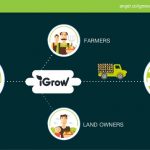 As more and more people live in cities, there is a sense that the world has become detached from the ways in which the food we eat finds its way to our plates.
As more and more people live in cities, there is a sense that the world has become detached from the ways in which the food we eat finds its way to our plates.
I’ve written about a couple of projects that have tried to change that. For instance, in the Netherlands, Koopeenkoe.nl is using crowdfunding to ensure that 100% of the meat from each cow is bought and accounted for before it is sent to the slaughterhouse.
The site has teamed up with a number of farms who are in turn working with the Lindenhoff meat supplier company. Lindenhoff are well known for their sustainable and ethical farming practices. The premise for the business is a simple one.
Or you have American company Zaycon Foods. They want to strip out many of these layers, replacing it instead with a simplified Farm > Truck > You distribution system. Zaycon host a series of sales events around the US, at which you can go and collect your meat (ordered online). The pitch is that this meat has come straight from the farm, so is fresher and better quality as a result.
One of the aims of both projects is that it gives people greater involvement in the food they consume.
Crop investing
A third project takes what these have done with meat and aims to replicate it with crops. iGrow is a platform that allows people to invest in seeds in much the way they invest in shares. Those seeds are then planted by farmers, with the ‘investors’ then able to harvest their yields in either financial or edible ways.
The Indonesian based project aims to connect up small farmers with urbanites from Jakarta who are looking for novel ways to invest their cash. It has a dual aim of giving rural farmers access to precious capital, whilst also reconnecting city dwellers with the farming process.
Users first of all select the seed they wish to grow, before then being paired up with a suitably experienced farmer to grow that crop for them. They can check in on the progress of their crop via the website, and then receive a share of the income when the crop is harvested.
This income can then be checked out, reinvested in the farm, or even donated to a local charity. Whilst the project is in a relatively young stage, it has already signed up 2,000 farmers.
It’s a nice project, and worth checking out via the website (linked above) or via the video below.